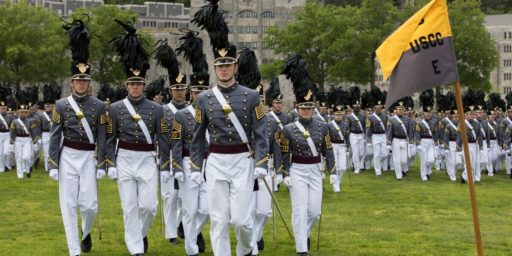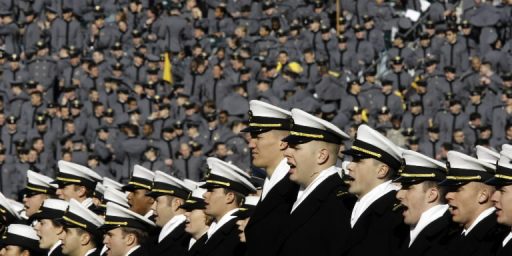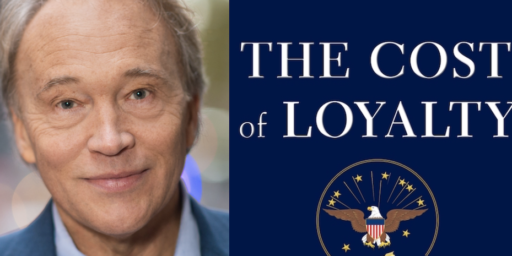Air Force Academy Unfriendly to Non-Christians
The U.S. Air Force Academy has started religious tolerance classes after numerous complaints of harrassment by non-Christian cadets.
Air Force Cadets See Religious Harassment (AP)
Less than two years after it was plunged into a rape scandal, the Air Force Academy is scrambling to address complaints that evangelical Christians wield so much influence at the school that anti-Semitism and other forms of religious harassment have become pervasive.
There have been 55 complaints of religious discrimination at the academy in the past four years, including cases in which a Jewish cadet was told the Holocaust was revenge for the death of Jesus and another was called a Christ killer by a fellow cadet.The 4,300-student school recently started requiring staff members and cadets to take a 50-minute religious-tolerance class. “There are things that have happened that have been inappropriate. And they have been addressed and resolved,” said Col. Michael Whittington, the academy’s chief chaplain.
More than 90 percent of the cadets identify themselves as Christian. A cadet survey in 2003 found that half had heard religious slurs and jokes, and that many non-Christians believed Christians get special treatment. “There were people walking up to someone and basically they would get in a conversation and it would end with, ‘If you don’t believe what I believe, you are going to hell,'” Vice Commandant Col. Debra Gray said.
Critics of the academy say the sometimes-public endorsement of Christianity by high-ranking staff has contributed to a climate of fear and violates the constitutional separation of church and state at a taxpayer-supported school whose mission is to produce Air Force leaders.
A generation ago, cadets at all the service academies were marched to church. A Christian prayer was offered at meals at West Point in the mid-1980s; they may well be to this day. It’s very much ingrained in the culture of the schools.
USAFA has more problems than its sister academies, though. In my view this comes mostly form the different leadership cultures of the services. A young Army or Navy officer is likely to be in charge of a large number of people in his first assignment and have opportunities to command throughout his early career. Most Air Force officers, by contrast, are technicians or part of a small team. A career pilot will do essentially the same job, flying a plane, for twenty years. Even the junior-most Army officer doesn’t drive a tank; that’s a job for junior enlisted soldiers. Most Army helicopter pilots are warrant officers. Those who are commissioned officers do most of their flying as lieutenants and captains and then move into mostly administrative jobs.
This translates into the academies, since the leadership standards are set by the junior and mid-career officers who man the faculty and tactical posts. If the captains and majors who are molding the young cadets aren’t accustomed to leading men, it’s rather difficult for them to transform their charges into leaders.






You’ll find that Air Force pilots have about the same career tracks as Army aviation (non-warrant) officers. They will fly the first 8-10 years of their careers, and then slowly progress to the leadership/management track. Basically their flying careers peak out about the time they make O-4.
Not that that matters, since less than 10% of AF officers fly.
Isn’t this more of the “few bad apples” theory we’ves seen applied in so many other circumstances?
It used to be that I thought the millitary buckled down and solved problems by staring them in the face and dealing with it.
Now I see that the new trend is to shift blame, point fingers and avoid responsibility by blaming the system.
Lovely.
squorch-
You’re correct, but those 10% have an enormous lock on command and senior staff assignments. Fortunately, the AF has gotten away from the practice in the past decade or so, but up until the early 90s, it was not uncommon for a pilot who needed “command experience” on his record to get promoted to be placed in charge of any available unit (communications, CE, services, etc.), regardless of his experience in that unit’s mission, and ahead of qualified officers in that career field.
These days there’s a lot more opportunity for non-flying officers to advance past O-5, but a lot of the central leadership corps (and much of the AFA staff) are still in the pilot fraternity.
I would also think the the Navigators’ International Offices being in Colorado Springs would contribute to a bit of extremism showing it’s ugly face.
Not that the Navigators is an extremist group… When Even in the 70’s wehn I was at Annapolisthe Navigators were an “enthusiastic” bunch.